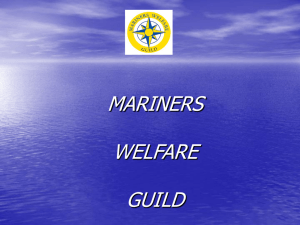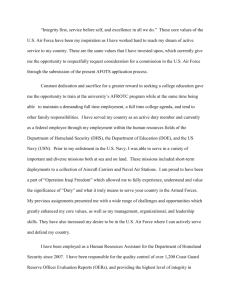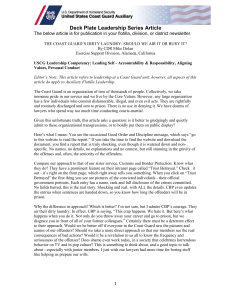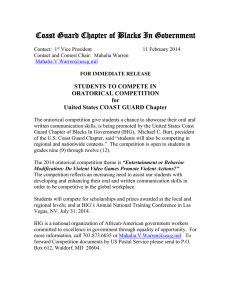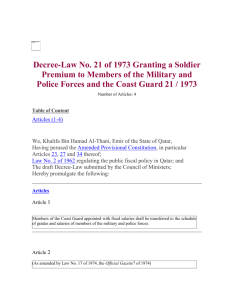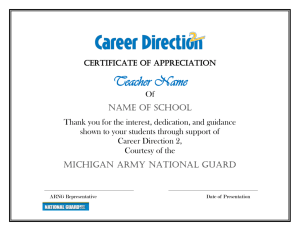Department of Homeland Security U.S. Coast Guard Docket No
advertisement
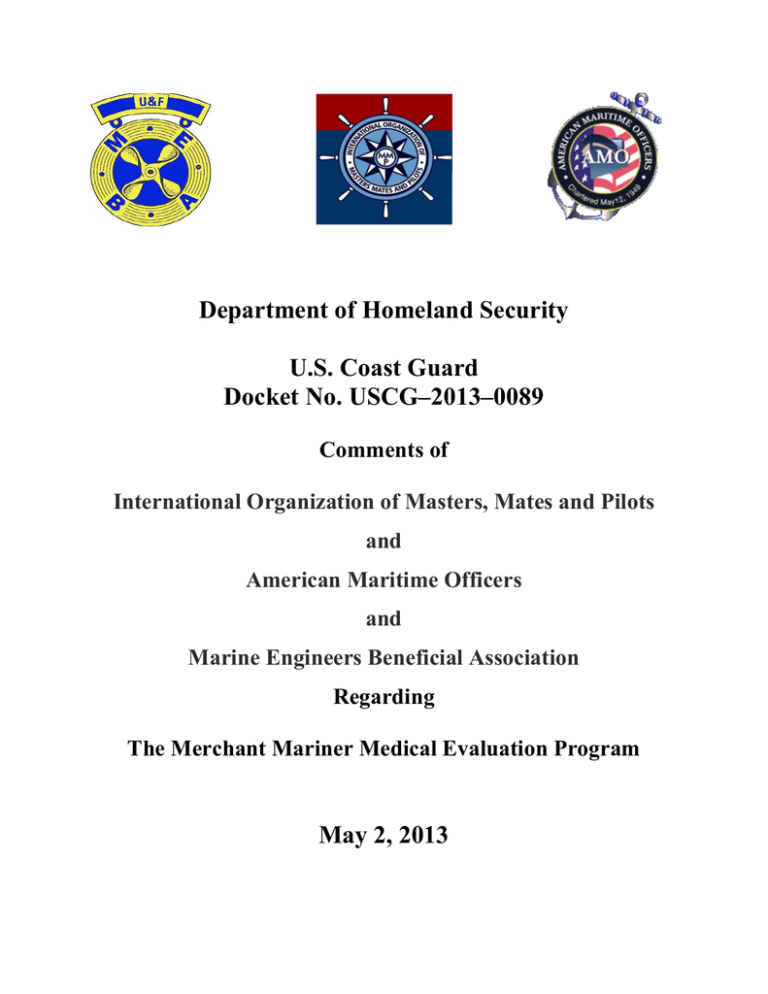
Department of Homeland Security U.S. Coast Guard Docket No. USCG–2013–0089 Comments of International Organization of Masters, Mates and Pilots and American Maritime Officers and Marine Engineers Beneficial Association Regarding The Merchant Mariner Medical Evaluation Program May 2, 2013 Department of Homeland Security, U.S. Coast Guard, Docket: USCG‐2013‐0089 Comments on Coast Guard Assessment of Medical Evaluation Programs Our organizations, the International Organization of Masters, Mates and Pilots (MM&P), the American Maritime Officers (AMO), and the Marine Engineers Beneficial Association (MEBA) represent substantially all the navigating and engineering officers on U.S.-flag commercial vessels in international trade, in addition to mariners on civilian-crewed ships in the government fleet, on towing vessels and ferries in domestic trade, harbor pilots and maritime industry shore side clerical and service workers. We have been on record with the Coast Guard and in testimony before Congress objecting to the present Coast Guard medical evaluation program since its inception. And, we welcome this long overdue assessment and opportunity to participate through public comments for change that would better align mariners medical evaluation of fitness for duty with the norms in other transportation modes in the U.S. and internationally. The current medical review program is based on a flawed concept that has a number of major problems. First, it attempts to evaluate and monitor for changes the medical condition of over 200,000 mariners with a small staff of medical evaluators at a central office who have never seen or spoken to the mariner. The evaluation is based solely on a stream of paper work between the National Maritime Center (NMC), the mariner and their doctors that can require multiple medical specialty consultations, imaging procedures, laboratory tests and time-consuming and often irrelevant evaluations to satisfy an unknown and distant medical evaluator with no direct contact with the mariner or his doctor. Mariners with more than one medical condition, which is a common occurrence, will be subjected to multiple time consuming and often unnecessary medical evaluations. Of major concern to mariners who are employed in international trades where assignments are four months aboard ship out of contact with the NMC followed by four months off duty is that the indefinite time lines, delays in the process and scheduling of multiple appointments for doctors, testing and evaluations when combined can result in the medical evaluation not being completed in time to meet their reassignment date. This can potentially result in the loss of four months of employment and eight months loss of income and benefits. This is an unacceptable and highly stressful consequence of the present program that is based on the premise that mariners are continually available to interface with the system and that all necessary appointments can be scheduled in a timely manner. The present medical evaluation process is not compatible with the long duration of shipboard assignments of many mariners. It is not sensitive to these time and scheduling issues and does not match the real world time limitations on the availability of mariners and medical resources. A mariner without insurance coverage may be subject to many thousands of dollars in expenses as a result of these burdensome and medically questionable procedures. In some instances these costs will be shifted to insurance carriers and ultimately to maritime employers and health plans. But more likely these tests will be deemed to be “medically unnecessary” by most insurance carriers, with the costs borne directly by the mariner. These costs have become a significant barrier to employment to both existing mariners and new entrants to the industry. 1 Department of Homeland Security, U.S. Coast Guard, Docket: USCG‐2013‐0089 Maritime labor and industry members of the USCG Merchant Marine Personnel Advisory Committee (MERPAC) have consistently advised the USCG during its initial discussion phase that such a proposed process was time consuming, expensive, and difficult for the mariner and the mariner's doctors who have to interface with a faceless and cumbersome bureaucracy at a remote location. It was reasonably foreseeable from the start that the current program was impractical and would lead to problems. A second flaw in the present medical evaluation program is that the guidelines for evaluating the physical and medical conditions of mariners contained in the Coast Guard Medical NVIC are not applied in a consistent manner by NMC medical evaluators. There is a need for clear guidance and transparency on what medical standards are to be applied in determining medical fitness for specific ship board duties. Hopefully this issue may be resolved by the Merchant Mariner Medical Advisory Committee developing clear guidance on medical standards and there application by independent medical examiners who understand the duties involved for different categories of mariner’s and actually physically examine the mariners. A third flaw in the concept is that it does not provide for a separate medical certificate. It links a medical evaluation to determine fitness for duty to a credential that is a certificate of professional competency with a five year term. Medical conditions and professional competency are two distinct and separate issues that should be covered under separate certificates that may have separate periods of validity. Linking the medical review to the five year term of the mariner’s professional credential creates the sticky problem of issuing waivers to track changes in medical conditions. Requiring the mariners to then notify the Coast Guard of changes in medical condition places them in the untenable position of self determining what degree of change triggers a requirement to notify the Coast Guard and place them at risk of the loss of their professional credentials and their career. Lamentably, the mariner may be prosecuted for allegedly making the wrong determination if he is involved in an accident where there is any possibility that his medical condition may be an issue. The problem of linking medical fitness to a certificate of competency, rather than a separate medical certificate may be solved by the new requirements of the ILO Maritime Labor Convention (ILO MLC 2006) that will apply to U.S. mariners working in international trades. The Coast Guard has indicated it is likely to apply the international ILO MLC 2006 provisions to mariners working in both the international and domestic trades. The international standard separates the medical certificate from the professional credential. The medical certificate is valid for a maximum period of two years. This solves the problem of waivers and continuing monitoring of mariners medical conditions. If there is a medical condition that may deteriorate with time the medical certificate can be issued for an appropriate period that allows for reexamination by a recognized and qualified medical practitioner without going through the cumbersome, expensive and time consuming current Coast Guard medical review process. It should also be recognized that compliance with the international two year maximum period for medical examinations would increase the workload of the present five year cycle for centralized medical evaluation by the NMC by 250%. This alone is a compelling reason for decentralizing the medical examination process to one of designated and qualified medical practitioners. 2 Department of Homeland Security, U.S. Coast Guard, Docket: USCG‐2013‐0089 We strongly support the ILO MLC 2006 provisions on medical evaluation of a mariner’s fitness for duty. They are based on a system that requires a medical certificate issued by a qualified medical practitioner recognized, i.e. "trusted", by the competent authority (USCG) as qualified to issue such a certificate. The medical practitioner has full professional independence in exercising their medical judgment in undertaking medical examinations. In such a system a registry of qualified medical examiners would conduct medical examinations and issue medical certificates as trusted agents of the Coast Guard. The assessment of the current Coast Guard medical evaluation program directed by Congress must specifically include an analysis of how a system similar to the Federal Motor Carrier Safety Administration’s (FMCSA) National Registry of Certified Medical Examiners program and the Federal Aviation Administration’s (FAA) Designated Aviation Medical Examiners program could be applied by the Coast Guard in making medical fitness determinations. We believe that the national FMCSA, FAA and international ILO MLC 2006 programs all follow the same general concept. Fitness for duty is determined by independent medical examiners on a national registry that are qualified to issue medical certificates based on established guidelines after an actual medical examination. This is a recognized normal method applied in the other modes of transportation both in the U.S. and internationally. We fail to understand why the Coast Guard has adopted a cumbersome, bureaucratic, time consuming, expensive and stress filled medical evaluation program that is outside national and international norms for U.S. mariners. In addition, the Coast Guard has asked for comments on a hybrid system whereby the designated medical examiner would issue medical certificates when mariners meet certain preestablished criteria, and the Coast Guard would only be involved in reviewing those mariners who have certain conditions. We can understand where this system would be of benefit to the Coast Guard, but see no benefit to mariners. Mariners in perfect medical condition that may reasonably be expected to meet the pre-established medical criteria would still be required to use designated medical examiners rather than using their own doctor. The many mariners, generally older with age related conditions, that do not meet the pre-established criteria would still be engaged with the bureaucratic NMC review process that we find objectionable for the reasons stated above. We believe the Coast Guard should adopt a medical evaluation program that follows the general concept of the FMCA, FAA and ILO MLC 2006 model. But the medical standards and guidelines to be applied should be tailored to the specific tasks and the working environment of specific categories of mariner’s developed by the Merchant Mariner Medical Advisory Committee. We believe such a program would improve the quality of medical evaluations and be far more efficient in speeding up the process by eliminating the time consuming delays involved in the exchange of paper work and dialogue with the NMC that is of great concern to mariners who have time constraints on their availability between shipboard assignments. We also recognize that there is a concern among some mariners that a registry of designated medical examiners may create a burden of finding a medical examiner and traveling an excessive distance with lost time from work to obtain a medical certificate. There is a clear need for a transition period where dual programs are in place, the present program and a 3 Department of Homeland Security, U.S. Coast Guard, Docket: USCG‐2013‐0089 designated medical examiner program, to permit time for the registry to grow to the size that Coast Guard designated medical examiners would be readily available throughout the entire U.S. This could be accomplished within a reasonable period of time by incorporating many of the thousands of medical examiners on the FMCA and FAA registries into the Coast Guard designated medical examiner registry. Donald Marcus, President IOMM&P Mike Jewell, President MEBA 4 Tom Bethel, President AMO
